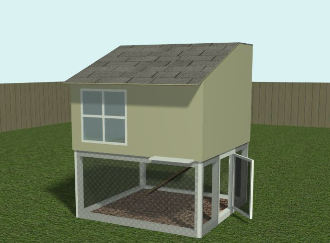Caring for chickens requires an area that will protect them from external elements, such as wild animals that can hurt or kill them, an area where they can be easily kept in comfort and convenience, and an area where eggs can be efficiently collected.
Making a coop is the perfect way to satisfy these three requirements for improved chicken care. A chicken house is a small dwelling place for animals, which provides a nesting place for chickens without compromising their freedom. Different types of coops exist today, most of them created not just by professionals, but also by simple owners who just want to take care of their chickens.
The basic chicken coop possesses an average range in the chicken coop design department – it has enough protective space and can comfortably house up to five chickens. The basic coop comes in a cube design, offering a 16-square feet area to house chickens in. As it is with most basic designs, the basic coop possesses the advantage of minimal resources: less wire, less lumber, less tools and less cost is required to create it. Time and effort requirements are less strict as well – the size of the materials needed ensures that the coop can be done in just one day. Of course, the main disadvantage comes in the form of low capacity.
A farmer cannot store more than the recommended amount of livestock without causing the chickens discomfort. The tractor coop, on the other hand, is a small-sized coop that is a perfect companion for a start-up chicken collecting business. Made from a triangular or circular frame, the tractor coop is covered with chicken wire and is complemented with a small number of nest boxes for easy deposit and claiming of chicken eggs.
The main advantage of the tractor coop is its mobility – the frame is easy to lift and move to other locations, while the lack of a wooden floor will allow chickens to eat plants and grass directly, reducing costs for chicken feed. The main disadvantage of a chicken tractor is its lack of accommodation, which can only keep two to four chickens. Another, the urban tractor, can accommodate slightly more birds without losing its easy-to-move ability. For a literal fleet for chickens, larger chicken coop designs such as the walk-in coop are highly recommended. A walk-in coop can take in from ten-thirty chickens, a whopping difference from the tractor coop and the basic coop. This type of coop stands tall to the tune of 8-9 feet, and can store feed, farming instruments and nest boxes, in addition to the chickens themselves. All these chicken-coop-designs can benefit different types of chicken keepers while catering to the needs of the chickens – the only thing needed is knowledge of one’s own chickens, a bit of carpentry skill, and a good sense of what kind of coop is perfect for both chicken safety and resource economy.
For more information on chicken coop design, please visit our http://www.chickencoopanswers.com center.
Locking chicken coop door that opens and closes via photocell.



2 Responses to Which Chicken Coop Design Is Right For You? – A Look at Different Types of Chicken Coops : chicken coops